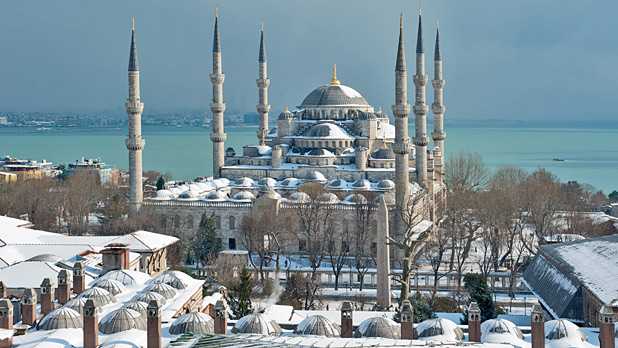Turkey Considers Cooperation with Greece on Illegal Immigration to Europe
Publication: Eurasia Daily Monitor Volume: 7 Issue: 194
October 27, 2010
By: Saban Kardas
Turkish Prime Minister, Recep Tayyip Erdogan, met his Greek counterpart, George Papandreou, on the margins of the Mediterranean Climate Change Initiative conference near Athens last week. The positive reporting of the Erdogan-Papandreou meeting marks the deepening rapprochement between the two countries, after their normalization slowed down in the second half of the 2000’s.
Characterized traditionally by historical enmity and territorial disputes, Turkish-Greek relations have undergone a remarkable improvement in the past decade. The so-called Greek-Turkish rapprochement started with the two earthquakes that devastated both countries in 1999. The mutual assistance and solidarity the two nations extended to each other in response provided fertile ground to develop closer political ties. As a result, Greece, which had blocked Turkey’s EU membership process, changed its policy and became an advocate of the EU’s enlargement to include Turkey. Since coming to power, Erdogan has ascribed special importance to normalizing ties with Greece, as reflected in his close personal relationship with the former Greek Prime Minister, Kostas Karamanlis.
However, in parallel with the deterioration of Turkish-EU relations, Turkish-Greek relations also experienced difficult times in the second half of the 2000’s. Although the Turkish-Greek trade volume has expanded throughout the decade, there has been little concrete progress over the political disputes that had traditionally dominated their relationship. The Turkish side largely preferred to pursue a policy of constructive ambiguity, and adopt a gradual approach to solving the disputes, while the Greeks from time to time expressed their disappointment over the ongoing uncertainty. Turkey’s resistance to referring the Aegean disputes to the International Court of Justice and the ongoing “dog fights” between Turkish and Greek fighter jets in the Aegean Sea remained a major source of disagreement, resulting in an occasional heightening of tension (EDM, June 22, 2009).
The global financial crisis, which dealt a serious blow to the Greek economic system, ironically, provided another fresh impetus to resolve bilateral disputes. In that context, the recent talks follow on Erdogan’s historic trip to Greece in May, when the two countries signed over 20 agreements to develop relations in various fields, including energy, the environment and illegal immigration. They also decided to launch the High Level Strategic Cooperation Council, which complemented similar arrangements Turkey has formed with its other neighbors. Erdogan also expressed Turkey’s readiness to help Greece to recover from the financial crisis, through what he called “enhanced economic partnership” The two sides, however, failed to reach any concrete agreement on the major issues in the bilateral relationship, such as the conflicting claims in the Aegean Sea, the status of the minorities, or the Halki seminary and the Cyprus issues (Anadolu Ajansi, May 15).
Granted, Turkish leaders’ extension of a friendly hand to Greece and their statements calling for dampening military tensions in the Aegean through closer bilateral dialogue was ground-breaking in many ways. This thinking is largely in line with Ankara’s recent policy of pursuing “zero problems with neighbors,” and prioritizing economic cooperation over political disputes. Indeed, as a stark reflection of this new thinking, Turkey will reportedly not include Greece, Russia, Iran and Iraq as enemy countries in its national security document, which is currently being revised.
Speaking to Greek TV stations, Erdogan, also expressed clearly that Turkish flights in the Aegean have decreased significantly and that Ankara supports the idea of ceasing them entirely (Today’s Zaman, October 21). By de-securitizing its relationship with Greece and its other neighbors, Turkey hopes to reap the benefits of peace dividends, by significantly cutting military expenditures and instead focus on mutual economic gains. In the case of Greece, by turning the Aegean into a basin of peace, the Turkish government hopes, for instance, to enable the exploration of offshore hydrocarbon resources, and further cooperation in the transportation of oil and gas to European markets.
It appears that the technical level contacts between both countries have continued since May, seeking common ground in their political disputes. In the wake of the latest trip, both parties are talking more resolutely about a shared strategic vision and pursuing win-win cooperative policies. Toward these objectives, there are stronger indicators that they might be involved in serious discussions on the resolution of thorny issues, including the Ecumenical Patriarchate and joint Turkish-Greek initiatives to curb illegal immigration to the EU. Following his meeting with Papandreou, Erdogan vowed to start cooperation on illegal immigration, so that they could tackle what he called a “common problem.” The Greek media even speculated that by the end of the year the parties might finalize a compromise agreement on the resolution of the Aegean disputes, on which they had already agreed in principle (Anadolu Ajansi, October 22; www.ekathimerini.com, October 25).
Most Turkish media outlets preferred to present Erdogan’s trip as a major achievement which boosted his popularity in Greece. Similarly, the Greek media also underscored the optimism generated by the Erdogan-Papandreou meeting (Taraf, October 24). However, some Greek observers maintain that the Papandreou government’s closer dialogue with the Turkish government “may ring alarm bells in many circles in Greece which would interpret it (and they do) as an indication of Greece losing diplomatic ground in the Aegean, or even in Greek Thrace” (Hurriyet Daily News, October 24).
In any case, the resolution of the remaining disputes with Greece serves the Turkish government’s foreign policy objectives. Especially by addressing the illegal immigration issue and the reopening of the Halki seminary, Turkey can remove major obstacles which have bedeviled its accession process into the EU. The EU has been expecting Turkey to harmonize its practices on illegal immigration with European regulations, and reopen the Greek Orthodox seminary to show its support for human rights. Moreover, through its constructive dialogue with Greece, Ankara solicits the support of Athens within the EU. Recently, the Turkish government has tried to mobilize the pro-Turkey EU members so that they could break the stalemate over membership talks. Reportedly, in exchange for its cooperation on the illegal immigration issue, Turkey expects Greece to at the very least, assist with the relaxation of European visa regulations for Turkish citizens.
https://jamestown.org/program/turkey-considers-cooperation-with-greece-on-illegal-immigration-to-europe/





